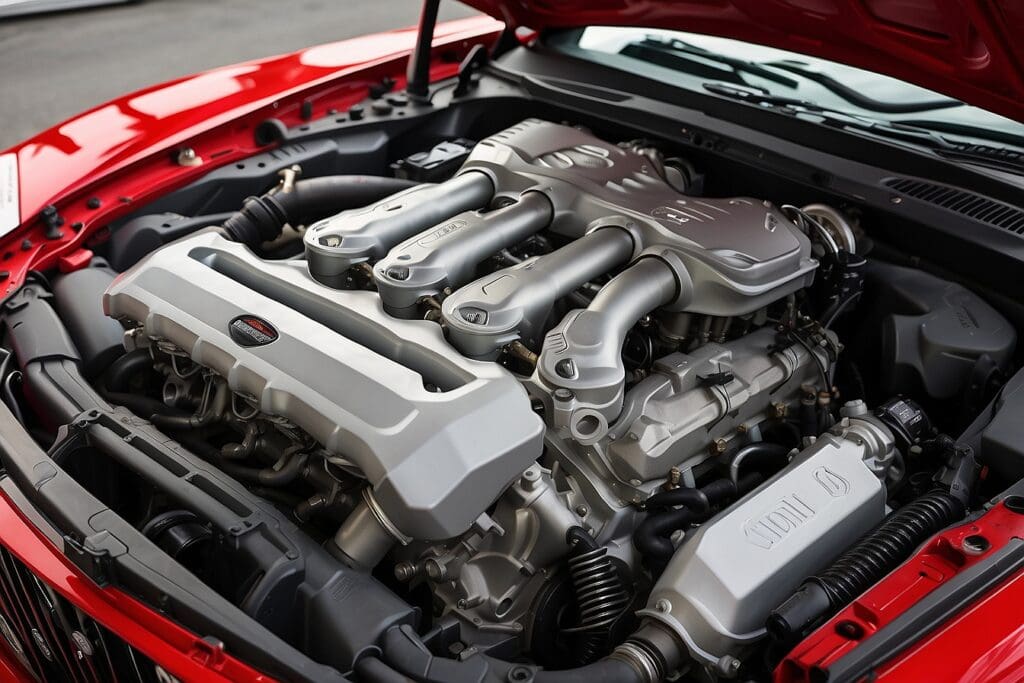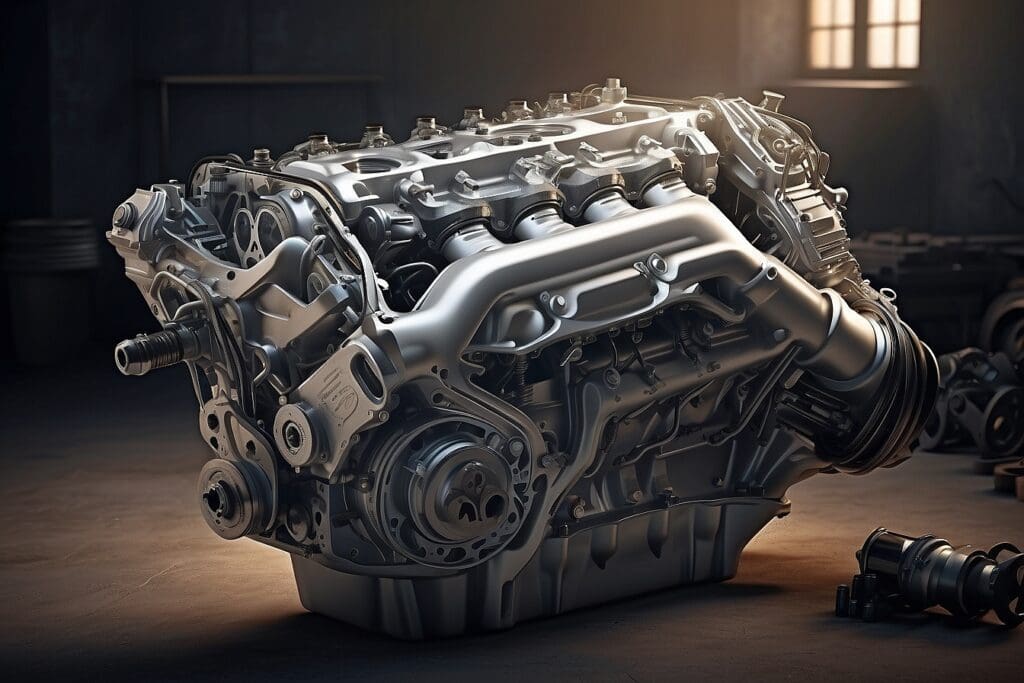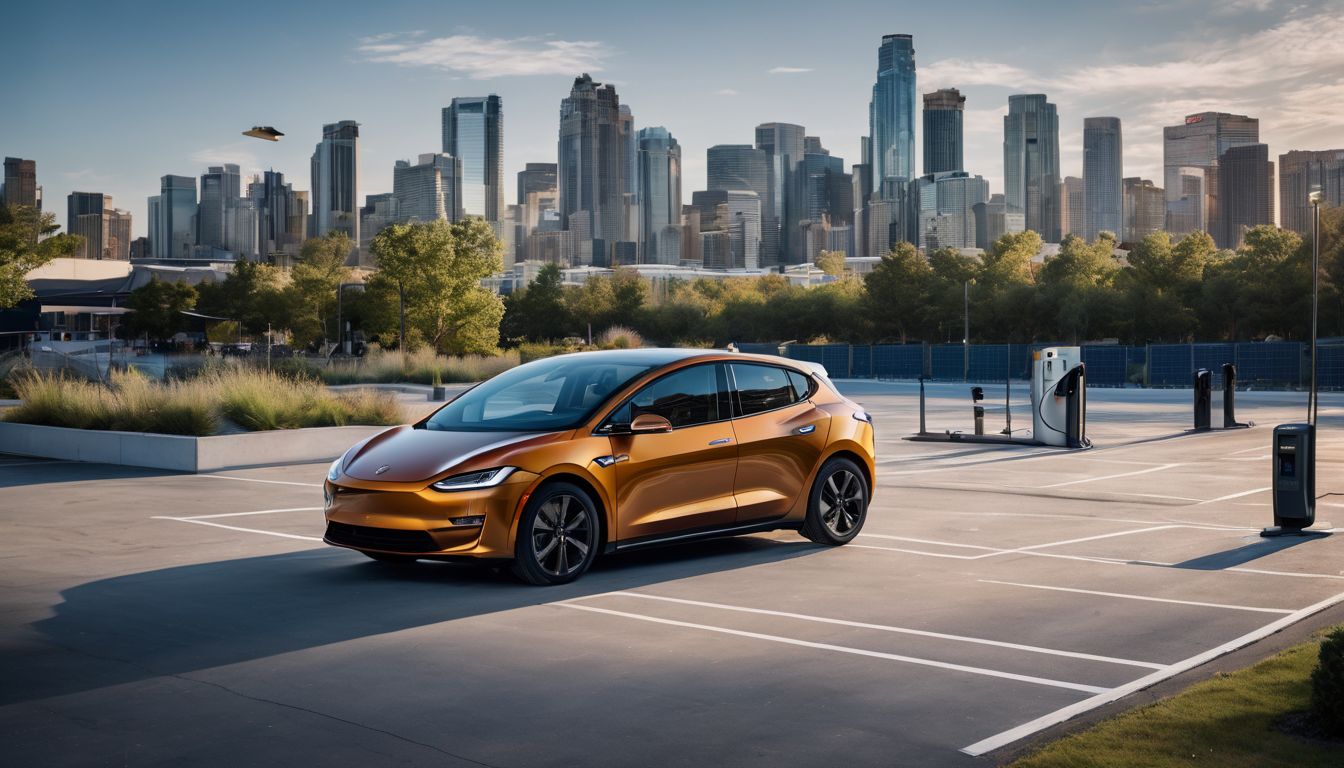We’ve all experienced that twinge of conscience as we turn the key in a petrol engine, aware of the emissions pouring out into the air. Just like you, I have felt a pang of concern about my environmental impact and have been proactive in seeking out how to make a positive difference.
What I’ve found is truly heartening: modern car engines are revolutionising the way we drive, bringing with them a welcome wave of eco-friendly benefits. Let’s explore together how these innovative technologies are forging paths towards a greener tomorrow!
Key Takeaways
- Modern car engines, especially electric ones, produce zero tailpipe emissions which greatly reduce greenhouse gas emissions and air pollution.
- Electric cars offer long-term cost savings with lower maintenance and refuelling costs, encouraging a shift from traditional petrol-powered vehicles to more environmentally sustainable options.
- Clean fuel technologies such as natural gas contribute to lowering GHG emissions and prevent environmental spills, enhancing the eco-friendliness of car engines.
- The increased popularity of electric cars is driven by their improved performance, including quieter operation with reduced noise and vibration for a more comfortable driving experience.
- Investments in infrastructure for electric cars like charging stations are essential to support the growing demand for these vehicles, promoting broader adoption and further environmental benefits.
The Environmental Impact of Traditional Petrol-Powered Cars
Traditional petrol-powered cars have a significant environmental impact, from the production and destruction of vehicles to the high levels of noise and vibration they produce. Fuel costs and emissions also contribute to poor air quality and infrastructure requirements.
Production and destruction of vehicles
Creating and scrapping vehicles takes a heavy toll on our planet. Factories consume vast amounts of resources, from steel to plastic, to build cars that often have short lifespans.
Once they’ve served their purpose, these same cars create piles of waste that can harm the environment.
We need to consider both ends of a car’s life cycle. Reducing the carbon footprint during production is just as crucial as ensuring vehicles are properly recycled or disposed of. By focusing on eco-friendly materials and manufacturing processes, we help lessen the negative impact on climate change.
Moving forward comes with its own set of challenges; fuel costs and emissions play a significant role in air pollution caused by vehicles still reliant on internal combustion engines.
Fuel costs and emissions
Reducing carbon emissions is a top priority for environmentally conscious individuals. The use of electric cars significantly lowers greenhouse gas emissions, providing long-term cost savings and reducing air pollution from vehicles.
Clean fuel technologies, such as natural gas engines and renewable energy sources, play a crucial role in lowering GHG emissions and preventing environmental spills. Moreover, the increased focus on eco-friendly cleaning methods for car engines promotes sustainable transportation by improving fuel efficiency and reducing criteria air emissions.
The positive impact of modern car engines on the environment is evident through decreased greenhouse gas emissions and lower fuel costs. Electric cars contribute to the reduction of carbon emissions while clean fuel technologies offer eco-friendly alternatives that align with conservation efforts.
Negative impact on air quality

Vehicle emissions from traditional petrol-powered cars have a detrimental effect on air quality, contributing to an increase in greenhouse gas levels and air pollution. These emissions release harmful pollutants such as nitrogen oxides, carbon monoxide, and particulate matter into the atmosphere, leading to respiratory problems and exacerbating climate change.
The high levels of these pollutants pose serious health risks, especially in urban areas where traffic congestion is common.
Furthermore, the combustion of fossil fuels by internal combustion engines produces volatile organic compounds (VOCs) which contribute to the formation of ground-level ozone and smog.
Infrastructure requirements
To support the widespread adoption of electric cars, an efficient and accessible infrastructure is crucial. The need for a network of charging stations across urban and rural areas is imperative to encourage drivers to make the switch from traditional petrol-powered vehicles.
Additionally, investment in renewable energy sources such as solar-powered charging stations can further reduce the carbon footprint associated with powering electric cars.
Creating a comprehensive infrastructure will involve collaboration between governments, businesses, and communities to ensure that charging stations are strategically located for convenient access.
High levels of noise and vibration
High levels of noise and vibration produced by traditional petrol-powered cars contribute to environmental pollution, impacting air quality and human health. The constant rumble of engines and the sharp vibrations emitted during operation add to urban noise pollution, affecting both wildlife and communities.
These disturbances can disrupt natural habitats for animals and compromise the well-being of individuals living near busy roads, underscoring the need for quieter, smoother-running car engines.
Reduced noise and vibration from modern car engines can significantly improve the overall environmental impact of vehicles, making them more sustainable for our planet’s ecosystems.
The Rise of Electric Cars and their Environmental Advantages
Electric cars offer a promising solution to reducing the environmental impact of traditional petrol-powered vehicles. With their zero-emission engines, long-term cost savings and improved performance, electric cars are paving the way for a greener future in automotive transportation.
Zero-emission engines
Zero-emission engines are a crucial component of environmentally sustainable transportation. By running on electricity, they produce no tailpipe emissions, reducing greenhouse gas emissions and air pollution.
These engines play a significant role in addressing the negative impact of traditional petrol-powered cars on the environment. Their use aligns with efforts to mitigate climate change and improve overall air quality, highlighting their positive impact on the environment.
Cars equipped with zero-emission engines also contribute to long-term cost savings for owners by eliminating fuel costs and reducing maintenance requirements. Additionally, these eco-friendly car engine cleaning technologies promote conservation while supporting environmental sustainability benefits for future generations.
Long-term cost savings
Electric cars offer significant long-term cost savings compared to traditional petrol-powered vehicles. With lower maintenance and refuelling costs, electric cars bring about substantial financial benefits for environmentally conscious individuals.
The reduced reliance on fossil fuels also leads to decreased fuel expenditure over time, which contributes to a healthier environment and supports conservation efforts. Additionally, the long-term durability of electric car engines means less frequent repairs and replacements, resulting in further cost savings.
The transition to electric vehicles not only aligns with environmental values but also offers practical advantages for those seeking sustainable transportation options. By embracing eco-friendly car engine cleaning methods and opting for electric cars with their associated long-term cost savings, individuals can actively support emissions reduction and contribute to the positive impact of vehicle engines on the environment.
No need for refuelling
Modern car engines with electric technology eliminate the need for refuelling, reducing reliance on fossil fuels and decreasing greenhouse gas emissions. Electric cars can be conveniently charged at home or at public charging stations, providing an eco-friendly solution that supports environmental sustainability.
This not only reduces air pollution but also contributes to long-term cost savings as drivers no longer have to spend money on fuel. With this convenient feature, ecoconscious individuals can contribute to a cleaner environment without sacrificing convenience.
Moving forward, let’s explore the reduced noise and vibration benefits of modern electric car engines.
Reduced noise and vibration
After considering the benefits of electric cars such as no need for refuelling, it’s important to also highlight their reduced noise and vibration. Modern electric engines operate quietly and smoothly, creating a more peaceful driving experience for both passengers and pedestrians.
The absence of traditional engine components means there are fewer vibrations and less overall mechanical noise, contributing to a more serene urban environment.
Additionally, advancements in battery technology have led to quieter cabin interiors, making the driving experience more enjoyable while also reducing noise pollution in cities. This reduction in noise and vibration not only enhances the comfort of electric car users but also has a positive impact on local communities and wildlife habitats.
Improved performance
Modern car engines are designed to deliver improved performance, providing enhanced power and efficiency while reducing emissions. These advancements contribute to a cleaner environment and reduced carbon footprint.
With eco-friendly technology and clean fuel options, modern car engines play a pivotal role in promoting environmental sustainability by delivering better mileage and lower greenhouse gas emissions.
The focus on improved performance not only benefits the drivers with better driving experience but also supports the conservation efforts for a greener planet.
The continuous evolution of modern car engines has significantly impacted environmental sustainability by delivering higher efficiency with reduced environmental impact. As we delve into the key features of advanced car engine technologies, it becomes apparent that their improved performance aligns with our commitment to conserving the environment for future generations.
The Future is Electric: Key Takeaways and Industry Statistics

The rise of electric cars is gaining momentum, with an increasing number of people recognising their environmental advantages. With the ongoing efforts to reduce carbon emissions and improve air quality, the shift towards electric vehicles is becoming more significant in the automotive industry.
Growing popularity of electric cars
Electric cars are becoming increasingly popular among environmentally conscious individuals. The rising awareness of climate change and the desire to reduce greenhouse gas emissions have contributed to this surge in popularity.
Moreover, advancements in technology have led to improved battery life, faster charging times, and increased driving range, making electric cars a more practical choice for many people.
As more individuals embrace eco-friendly transportation options, the demand for electric vehicles continues to grow. This trend not only benefits the environment but also drives innovation in cleaner and more sustainable modes of transportation.
Reducing carbon footprint
To reduce carbon footprint, consider choosing eco-friendly car engines like electric vehicles which produce zero emissions. Opting for these modern car engines minimises the environmental impact of vehicle engines, contributing to cleaner air and a healthier planet.
By embracing clean fuel technologies and sustainable car engine cleaning methods, we can actively lower greenhouse gas emissions from cars and shift towards a more eco-friendly transportation system.
Making informed choices about our car engines can lead to positive environmental sustainability benefits, aligning with conservation efforts and combating climate change.
Key features and advantages
Reducing carbon footprint enables car engines to offer a multitude of key features and advantages, providing significant environmental benefits. These features include:
- Increased energy efficiency, reducing reliance on fossil fuels and decreasing greenhouse gas emissions.
- Enhanced performance with quieter operation, smoother acceleration, and reduced vibrations for a more comfortable driving experience.
- Lower maintenance costs due to the simplified design and fewer moving parts in modern car engines.
- Integration of innovative technologies such as regenerative braking and energy recovery systems to improve overall sustainability.
- Reduced air pollution through advanced exhaust treatment systems that minimise harmful emissions.
Benefits for the environment
Modern car engines offer significant environmental benefits, such as reducing greenhouse gas emissions and improving air quality. With the rise of electric cars and clean fuel technologies, the automotive industry is making strides towards sustainability.
These advancements not only contribute to lowering our carbon footprint but also lead to a cleaner and healthier environment for current and future generations.
The positive impact of modern car engines on the environment cannot be overstated. By embracing eco-friendly technologies, we are actively working towards mitigating climate change while enjoying the convenience of efficient transportation.
It’s clear that these innovations are crucial for creating a sustainable future where vehicles coexist harmoniously with nature.
The Role of Clean Fuel Technologies in Enhancing the Environmental Sustainability of Car Engines
Clean fuel technologies, such as natural gas and renewable natural gas, are playing a crucial role in reducing greenhouse gas emissions and preventing environmental spills from car engines.
To learn more about the positive impact of modern car engines on the environment, continue reading our blog.
Use of natural gas and renewable natural gas
Natural gas and renewable natural gas are increasingly being utilised as clean fuel technologies to enhance the environmental sustainability of car engines. By using these alternative fuels, greenhouse gas emissions can be significantly lowered, contributing to the reduction of criteria air emissions harmful to the environment.
Moreover, the use of natural gas and renewable natural gas also helps in preventing environmental spills associated with traditional gasoline or diesel fuel.
As environmentally conscious individuals supporting conservation and environmental sustainability, it’s essential for us to acknowledge the positive impact that embracing cleaner fuel options like natural gas and renewable natural gas can have on climate change and our efforts towards a greener future for car engines.
Lowering GHG emissions
Lowering GHG emissions helps in reducing the overall carbon footprint of cars, contributing to a healthier environment. By using clean fuel technologies such as natural gas and renewable natural gas, car engines can significantly lower their greenhouse gas emissions.
This shift towards cleaner fuels also leads to reduced criteria air emissions and prevents environmental spills, promoting eco-friendly practices for a more sustainable future.
Focusing on lowering GHG emissions supports the effort to combat climate change and reduce the negative impact of vehicles on the environment. Through increased awareness and implementation of these technologies, we can contribute to a positive change in our ecological footprint while enjoying the benefits of modern car engines.
Reduced criteria air emissions
Modern car engines are designed to reduce criteria air emissions, which significantly improves air quality. By utilising clean fuel technologies such as natural gas and renewable natural gas, car engines can lower greenhouse gas emissions and prevent environmental spills.
These eco-friendly advancements not only benefit the environment but also contribute to the overall sustainability of car engines by promoting cleaner air for everyone.
Incorporating these clean fuel technologies into modern car engines is key to reducing criteria air emissions further, aligning with our goal of supporting conservation efforts and environmental sustainability.
Prevention of environmental spills
Preventing environmental spills is essential for maintaining the sustainability of car engines. Implementing eco-friendly cleaning methods for car engines and using natural gas or renewable natural gas can significantly reduce the risk of harmful spills.
Lowering greenhouse gas emissions and criteria air emissions through clean fuel technologies plays a pivotal role in preserving the environment.
Focusing on preventing environmental spills and using eco-friendly cleaning methods ensures that car engines have a positive impact on the environment, supporting conservation efforts for a cleaner, greener future.
Increased focus on eco-friendly cleaning methods for car engines
Transitioning from the prevention of environmental spills to eco-friendly cleaning methods for car engines showcases a concerted effort towards sustainable practices in the automotive industry.
The increased focus on eco-friendly cleaning methods aligns with the growing demand for clean technology and environmentally friendly cars, benefitting both vehicle performance and environmental sustainability.
This shift reflects an important step forward in promoting positive impact of cars on the environment while addressing climate change concerns, contributing to the overall conservation efforts.
Conclusion
In summary, modern car engines offer significant environmental benefits. They reduce greenhouse gas emissions, improve air quality and contribute towards combating climate change. Embracing clean fuel technologies and transitioning to eco-friendly cars will play a crucial role in protecting our planet for future generations.
With the continued innovation in car engine technology, we have the opportunity to drive towards a more sustainable and environmentally friendly transport system. The shift towards modern car engines is a vital step in creating a cleaner and healthier environment for all.
FAQs
1. What are the environmental benefits of modern car engines?
Modern car engines help fight climate change by being more fuel-efficient and releasing fewer emissions, making cars more eco-friendly.
2. How do newer car engines reduce the impact on climate change?
Newer engines are designed to burn fuel cleaner and with better technology that cuts down harmful exhaust gases, which helps in reducing vehicles’ contribution to climate change.
3. Can modern car engines really make a difference for the environment?
Yes, as they use advanced technologies to lower pollutants and improve mileage, modern car engines play a significant role in creating a greener future with less pollution from vehicles.
4. Are all new cars fitted with these eco-friendly engines?
Most new cars come equipped with modern engines that aim for better environmental performance, but it’s important to check each vehicle’s specifications for its eco-friendliness.





